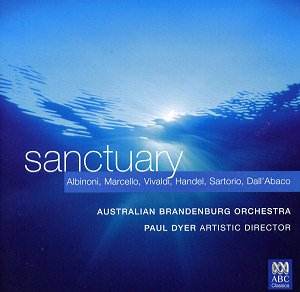Paul Dyer, the Artistic Director of the Australian Brandenburg
Orchestra, comments at the start of the booklet notes: “In this
recording we encourage the listeners to explore their dreams,
emotions and inner thoughts, as released by the music.” He continues:
“In Sanctuary, we hope to bring you out of your day-to-day world”.
Now oddly enough although I have reviewed hundreds of
discs for MusicWeb I do not always give my opinion forcefully;
this time I will and say that I have hardly ever encountered
such a load of baloney. I do not feel for one minute that baroque
oboe or violin concertos, or arias arranged for oboe and orchestra
are any more likely to help me to “seek refuge, or to be rejuvenated”
than any other music. Quite frankly it is simply a selling point
for a fairly ‘run-of–the-mill’ disc of baroque music. ‘So what!’
I hear you cry, let’s enjoy, and listen. OK then. Let’s do just
that. What do we have?
Actually we have some good playing on period instruments
of repertoire not often encountered. I can’t help but feel that
the aristocrat Alessandro Marcello is a much underrated composer
in whose music I can almost smell Venice, as most definitely
you can of course when listening to Vivaldi who is well represented
here by a clever Double Concerto. Although Dall’Abaco is little
known today he quite clearly has a strong sense of melody and
line. It is particularly interesting to compare the Cantabile
from the Op. 6 in the classical ‘galant’ style brought over
from France, with the slow movement of the Op. 5 Concerto which
is, with its compound time Siciliane-type rhythm, far more Italianate.
Handel, of course stands apart even when ‘[dis]arranged’. Albinoni
can be rather ordinary but this concerto is especially arresting.
In the midst of all of this we have some beautifully
elegant and at other times superbly agile oboe playing, a warm
and realistically balanced recording, and equally importantly,
a nice contrast of speeds as you listen through the disc. There
are some fine cameo roles from Lucinda Moon playing baroque
violin in Dall’Abaco’s ‘Cantabile’ for example. If I say therefore
that the disc makes an excellent accompaniment to a romantic
dinner for two, I am not too far off the mark. However I also
feel that I am not doing the players or some of the pieces full
justice to say the least.
So let’s try it after dinner, with some port to hand
and a black coffee. Is it all a bit ‘samey’, well yes but, if
you are dozing or flicking through the paper then it doesn’t
matter. Anyway there are also very lively concerto movements
to wake you out of your reveries as for example the outer movements
of Dall’Abaco’s concerto. Some tunes you know, like ‘Where’er
you walk’ and ‘Waft her, angels’; otherwise the music washes
over you in the colour of the CD booklet: a warm sunset blue
and purple.
As for the music offering a ‘spiritual’ experience. Well,
arguably all music does that to some extent. It’s all a case
of attitude of mind. If you are in the mood for late night arrangements
of Italian arias and for oboe or string concertos then this
is your ‘man’, and indeed you can let it soak in. I am however
convinced that this disc would have done itself more justice
if it been called simply ‘Baroque Concertos and Transcriptions’
or something of that kind.
The booklet notes are excellently presented and quite
detailed on the music and composers. There is a useful section
called ‘A note on the Aria Transcriptions’. Here Paul Dyer usefully
reminds us that “Baroque composers used to make new music out
of old – pinching an existing aria [it didn’t matter if it was
their own] to insert into a new opera”. So therefore the arrangements
of Sartorio and Handel are completely kosher.
Paul Dyer has researched the composers especially well
and includes much on Dall’Abaco. Nothing he has written is over-technical,
but whether in your effort “to be still” you will be bothered
to read them is another matter.
Gary
Higginson

![]() Kirsten Barry (baroque oboe); Lucinda Moon (baroque violin); Jamie Hey,
(baroque cello).
Kirsten Barry (baroque oboe); Lucinda Moon (baroque violin); Jamie Hey,
(baroque cello).![]() ABC
CLASSICS 476 2840 [60.38]
ABC
CLASSICS 476 2840 [60.38]










